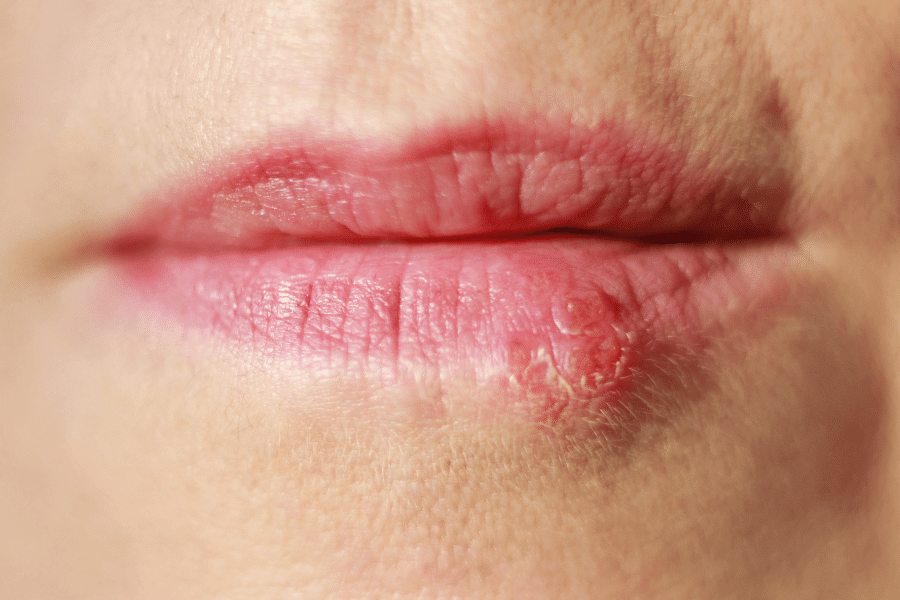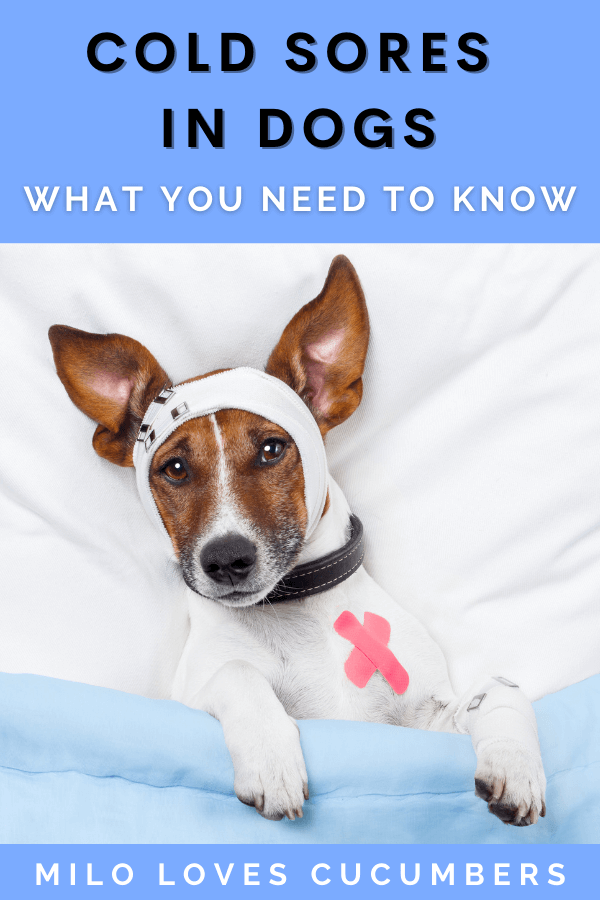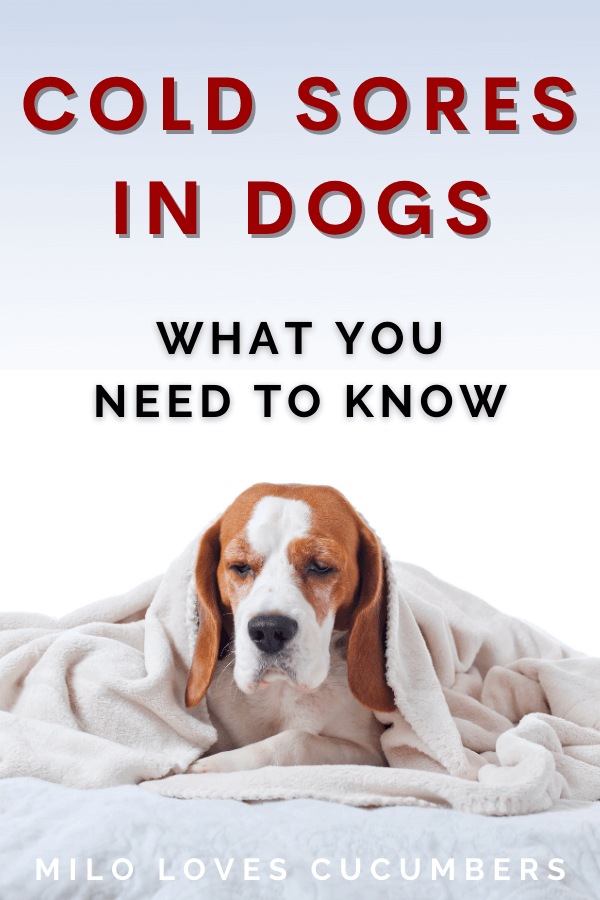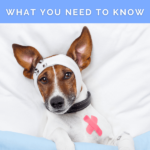We all hate that feeling when we feel a painful bump in our month and instantly realize we have a cold sore. Now, what happens when your dog comes over to you wanting cuddles and kisses but you have a cold sore? Can dogs get cold sores from humans? I would hate to be the cause of why Milo has a cold sore!
Bottom line is that no, canines cannot get cold sores from humans as the Herpes Simplex Virus is not transmittable to dogs. So rest assured they will be fine if you kiss and pet them when you have a cold sore. But your four-legged best friend can contract herpes strains from other animals.

Disclosure: This post may contain affiliate links. If you purchase a product through one of our affiliate links we make a small commission from the sale at no extra cost to our readers.
Cold Sores and Herpes
Cold sores are generally nothing to get nervous about, most of us have had at least a few in our lifetime. They do not cause a lot of damage and are not harmful to people.
However, what we often refer to as a cold sore is actually a symptom of the herpes virus.
These painful inflamed bumps around the mouth area can be contracted by both humans and animals but can only be passed to the same species – this is because they are different strains of the virus.
In people the virus is Herpes Simplex Virus and in dogs it is Canine Herpes Virus.
So just like people cannot contract certain diseases from dogs, this is the case with human cold sores!
Contracting Canine Herpes
In the same way that people contract Herpes Simplex Virus, dogs can contract Canine Herpes Virus – through contact with open sores, bodily fluids, or through breeding.
When female dogs with CHV give birth to a litter, the puppies can also become infected and have a very high mortality rate.
This is why it’s especially important to isolate infected dogs until they are treated!
Canine Herpes and Puppies
Even though pet owners cannot transmit cold sores or the herpes virus that causes them, HSV-1 and HSV-2 (or Herpes Simplex Virus), dogs can still get cold sores.
Canine Herpesvirus (CHV), also known as Canine Herpes, can be passed from dog to dog.
However, it is not contagious to humans and is usually not fatal to your four-legged companion.
It is highly fatal to puppies, though.
Puppies contract this virus from other dogs when an adult dog’s reproductive system is infected with the virus. So mothers with CHV can pass it along to their pups.
If you notice your puppy having any of the following symptoms, be sure to make an appointment with your vet immediately:
- Lack of appetite
- Abdominal bloating
- Shivering
- Nasal discharge
- Abnormal or soft stools
Canine Herpes and Adult Dogs
Adult dogs can contract the herpes virus from other dogs, as well as pass it along to new dogs they come in contact with.
Thankfully, it is not usually a big deal in adult dogs, and is not fatal once your dog has grown out of the puppy stage.
So while you shouldn’t panic right away, if you see any of the following symptoms in your pooch then it might be time for a trip to the vet:
- Soreness around the genitals
- Little bumps on their snout or around their mouth
- Lack of appetite
- Avoid being petted or even touched
- Chewing on the area with a cold sore
- Chewing their food differently to avoid the cold sore
- Discoloration of the tongue, gums, or lips
If you notice any of these symptoms I would advise going to the vet for a check-up just in case.
Even if your pooch is no longer a puppy – it’s always better to be on the safe side!
Canine herpes in adult dogs may not have the same effects as it does in puppies, but that doesn’t mean they cannot transmit it to other dogs!
Just like in humans, though, adult dogs may not display any symptoms of the virus.
CHV Treatment
First off, if you notice any of the symptoms above in your puppy or adult dog, take him or her to the vet to get a proper diagnosis.
If CHV is found, the vet will likely prescribe an antiviral medication and lots of rest.
Your pup might also come out with a cone to prevent them from licking any infected spot on their body.
With treatment, the blisters usually go away within a week. So if it does not seem to be going away after 10 days, it might be a good idea to check in with your vet.
Also, during the time of treatment, be sure to keep your pooch away from other dogs to prevent spreading the virus.
CHV Prevention
Unfortunately, there is no CHV vaccine that is available in the United States at this time.
A vaccine has been developed in Europe, but has not been approved for use in the US.
That means that the best method of prevention is to keep a sick dog at home until they get treatment, and to keep your dog away from other dogs who you know are sick.
So if you’re at the dog park and you notice another dog with any of the above listed symptoms, the best thing you can do is to keep your dog away so that they do not get infected!
Signs That A Dog Is Sick
Canine herpes symptoms might not be present in all dogs who are infected. And when symptoms are present, the symptoms might be very general and hard to see.
Dogs who are sick often display unusual behavior for their personality. So as a fur-mama I look for a few distinct symptoms that tells me my pup is not feeling well.
- You may notice your dog does not want to play as much and is very tired if they are sick.
- They may not eat or they may have irregular eating patterns – Milo never skips a meal so if I notice he’s not eating, this definitely tells me something is up!
- Their nose might be hot and dry, instead of cold and wet – this usually signals a fever.
- Dogs who are sick may start throwing up their meals or dry-heaving.
If you notice your dog displaying any of these symptoms or acting differently than he normally would, contact your vet to get him checked out!
Playing with your dog with CHV
Since CHV is not contagious to people, there is no harm in playing with your dog if he or she has Canine Herpes.
You should not, however, take your dog to the dog park or expose them to other dogs until they get treated.
And if your dog has open sores on their body, be sure to take it easy on them as it might be painful for them to run around or play.
Also, if your dog wants to give you some kisses, you do not need to worry about contracting CHV!
Similarities Between HSV and CHV
Both Herpes Simplex Virus and Canine Herpes Virus are contagious, but can only pass to the same species. That is, animal to animal and human to human.
Both HSV and CHV can be passed by sexual contact or other bodily fluids.
They also both look very similar, with swollen areas and sores on different parts of the body.
HSV and CHV treatment is also similar – treated by antiviral medication, lots of rest and isolation.
Also, recovery time is generally similar, ranging anywhere from 7-10 days.
Neither HSV or CHV are deadly, except in puppies. CHV can be fatal to puppies less than 2 to 3 weeks of age, and can even cause abortions in pregnant females infected with CHV.
Can my dog give me a cold sore?
No, just like humans are not able to pass the herpes virus to dogs, our canine friends are not able to transmit the Canine Herpes Virus to humans. These two different types of herpes are not transmittable between species, meaning that dogs can only pass it along to other dogs.
Are There Any Home Remedies For CHV?
Sadly there is no product that can make your fur baby’s cold sore go away overnight, but you may be able to use over the counter topical ointments to make your pooch feel better. Allow your dog to get plenty of rest and try feeding him or her soft food if they have a blister close to their mouth.
Can Dogs Get Sick?
Yes, dogs can get sick just like people do! However, dog illnesses are usually specific to dogs. If you notice your dog’s behavior is different than normal, it’s always best to consult a vet to make sure your pooch is okay! And of course, if your vet prescribes treatment for your dog, always be sure to follow the treatment exactly to make sure your fur-baby gets better!
So to sum up, you cannot give your dog cold sores, nor can your dog pass them to you. If you do notice any of the signs and symptoms above, however, it’s important to contact your vet. Just like you would never want another dog to be the cause of your fur-baby getting sick, you don’t want to pass along the virus to other dogs!
Pin it for later!




